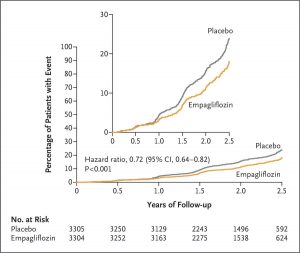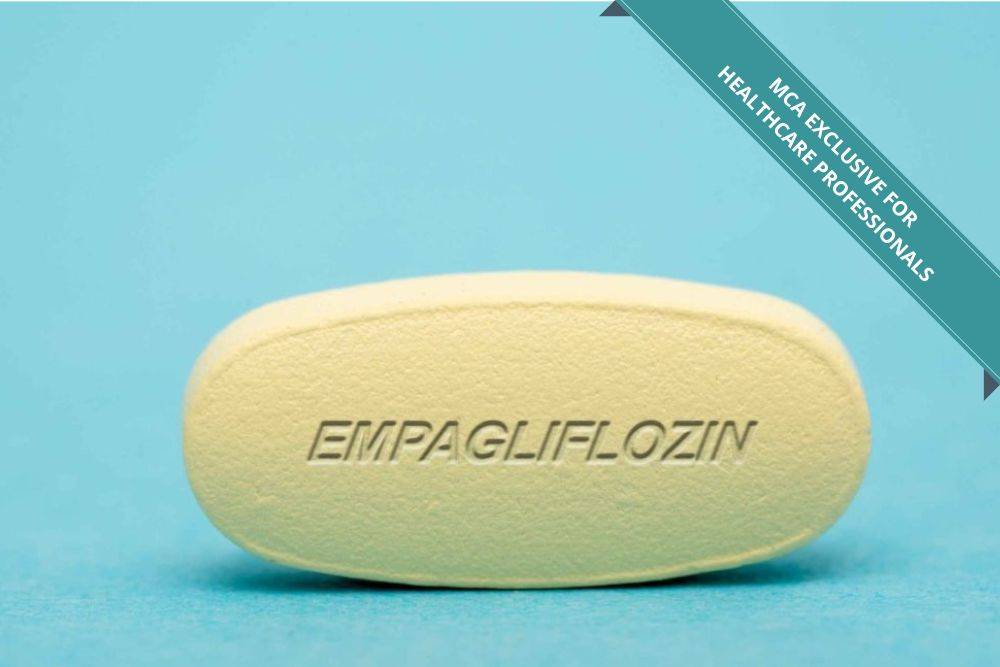In the past few years, there has been an expansion of indications for SGLT-2 inhibitors. Initially used as add-on therapy in the treatment of type 2 diabetes, the current evidence supports its use as first line treatment for diabetes in patients with high risk of atherosclerotic cardiovascular disease (ASCVD), use as adjunct therapy heart failure with reduced ejection fraction (HFrEF) and for chronic kidney disease (CKD) [1].
There is already evidence for Canagliflozin and Dapagliflozin use in CKD, based on the results from CREDENCE trial and DAPA-CKD trial specifically. However, the results of these trials were insufficient to support the benefits of SGLT-2 inhibitor treatment in patients with urinary albumin-to-creatinine (uACR) ≤ 300mg/g
The EMPA-KIDNEY [2] trial was designed to assess the effect of once-daily Empagliflozin on the progression of kidney disease and cardiovascular disease and to examine the safety profile of the drug in a wide range of patients with CKD. To note, this trial included patients with eGFR ≥ 20 mL/min/1.73m2 regardless of albuminuria and for patients with eGFR of ≥ 45 mL/min/1.73m2, they must have a uACR of at ≥ 200mg/g. All patients were required to be on a clinically appropriate renin angiotensin system (RAS) inhibitor unless the investigator judged that RAS inhibitor was not indicated or would not be tolerated. This trial also included patients with or without diabetes or cardiovascular history.
The primary outcome was the first occurrence of progression of kidney disease or death from cardiovascular causes. Progression of kidney disease was defined as either sustained decline in eGFR of more than 40%, end stage kidney disease or death from renal causes
The key secondary outcomes were composite of hospitalization for heart failure or death from cardiovascular causes, hospitalization from any causes and death from any cause.
Results
The trial was terminated early as conditions for stopping early for efficacy were met based on primary outcome events. The median follow up time was 2 years.
Patients in the Empagliflozin group were 28% less likely to experience progression of kidney disease or death from cardiovascular causes, compared to the placebo group (P<0.001) (Figure 1). Hospitalisations from any cause were also significantly lower in the Empagliflozin group compared to placebo group. There was no significant difference with respect to the composite outcome of hospitalization for heart failure or death from cardiovascular causes. 
Figure 1. Progression of Kidney Disease or Death from Cardiovascular Causes.
The benefit of Empagliflozin treatment was consistent among patients with or without diabetes and regardless of eGFR at randomization (Figure 2). Patients in the Empagliflozin group with mild-moderate albuminuria did not see a significant decrease in primary outcomes due to a lower than expected incidence of cardiovascular events, likely because the rate of CKD progression in these groups tended to be slower.

Figure 2. Primary Outcome in Key Prespecified Subgroups.
An acute decrease in eGFR in the Empagliflozin group was observed within the first 2 months of initiation, though the rate of annual decline slows after this initial decrease (Figure 3). At the end of 36 months, patients in the Empagliflozin group had a higher eGFR compared to placebo despite the initial acute decrease.

Figure 3. Change from Baseline in the Estimated GFR.
Safety
Incidence of ketoacidosis and lower limb amputations were largely similar between the Empagliflozin and placebo group. There was no evidence to suggest that Empagliflozin treatment increased the incidence of serious adverse events in any particular system organ class.
Conclusion
The results of this trial shows that the addition of SGLT-2 inhibitors to ACEI/ARB even in patients with mild to moderate proteinuria can help slow progression of kidney disease and reduce risk of death from renal causes. This benefit is regardless of diabetes status or cardiovascular history. SGLT-2 inhibitors are also safe up to eGFR of ≥ 20 mL/min/1.73m2. A meta-analysis done by the Asian Renal Collaboration [3] found that approximately 434.3 million people have CKD across the eastern, southern and south-eastern regions of Asia and up to 65.6 million have advanced stages of CKD. In addition to active screening and diagnosis of CKD in the earlier stages, recognising the benefit of earlier treatment such as the use of ACEI/ARB and now, SGLT-2 inhibitors, can help to slow progression, improve quality of life and reduce healthcare costs [4].
References:
- Sodium Glucose Transport Protein 2 Inhibitors [Internet]. [cited 2023 Aug 12]. Available from: https://www.ncbi.nlm.nih.gov/books/NBK576405/
- Empagliflozin in patients with chronic kidney disease. New England Journal of Medicine. 2023;388(2):117–27. doi:10.1056/nejmoa2204233
- Liyanage T, Toyama T, Hockham C, Ninomiya T, Perkovic V, Woodward M, et al. Prevalence of chronic kidney disease in Asia: A systematic review and analysis. BMJ Global Health. 2022;7(1). doi:10.1136/bmjgh-2021-007525
- Slow Progression & Reduce Complications. [Internet]. [ cited 2023 Aug 12]. Available from:. https://www.niddk.nih.gov/health-information/professionals/clinical-tools-patient-management/kidney-disease/identify-manage-patients/manage-ckd/slow-progression-reduce-complications

